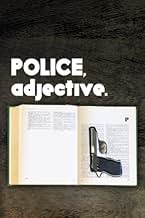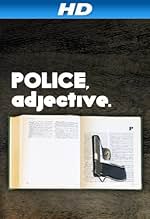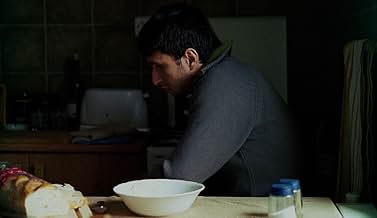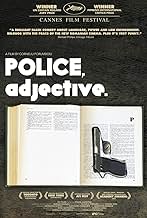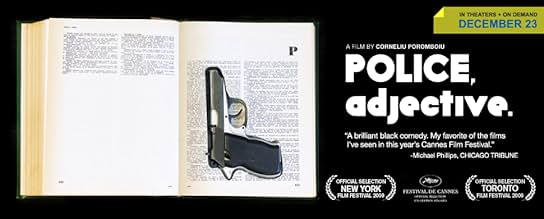AVALIAÇÃO DA IMDb
6,9/10
5,4 mil
SUA AVALIAÇÃO
Adicionar um enredo no seu idiomaA police officer refuses to arrest a young man for offering drugs to his friends.A police officer refuses to arrest a young man for offering drugs to his friends.A police officer refuses to arrest a young man for offering drugs to his friends.
- Prêmios
- 15 vitórias e 15 indicações no total
George Remes
- Vali
- (as Remes George)
Constantin Dita
- Officer on Duty
- (as Costi Dita)
Avaliações em destaque
I first watched this film about a year ago, and I struggled through it because it truly is one of the slowest and uneventful films you'll ever see, but It has grown on me a lot and isn't a film that you'll forget after seeing. The film deals with themes like guilt, responsibility, choice, patience, with some underlined political themes. Its one thing to conceptualize a film effectively but it's another to execute it correctly, and I think Corneliu Porumboiu did a very honorable job in both those departments. It's one of my favorite films, actually. there's a scene near the end of the film where the main character, one of his colleagues, and his boss are sitting in his office discussing the main character's struggle between the law and his own conscience. This scene goes on for close to 30 minutes if i remember correctly, and it's all done on one shot, with the exception of a few little overlapping shots to view the contents of a dictionary in the main character's hands. I was really impressed by that whole scene. Even if you don't love it, it's definitely worth at least one watch.
This is a film about a policeman and a matter of conscience. There's a circle of three friends, two boys and a girl, one boy has denounced the other boy to the police for supplying marijuana, it appears that this is so he can have the girl to himself. Our policeman, Cristi is being pressed to slap the cuffs on the kid by his superior, the charge is a life-wrecker, seven years in prison for smoking joints at lunch break. Cristi spends the movie trying to avoid this outcome. As he says, it's a foolish law.
Cristi is pushing against a bureaucracy that simply doesn't care, and ends up looking like a fool when he talks to people who are more educated with him, for example suffering his girlfriend's overanalysis of a ludicrous ballad, or the pseudo-dialectics of his boss, a masterpiece of sophistry. The point is that language or words often constitute another form of aggression, as the Athenians knew, you can win any argument once you have mastered rhetoric. Of course, as soon as anyone raises their voice or gets upset, this is taken as a sign that they've lost the argument, the intellectual warfare, losing having nothing whatsoever to do with being right or wrong of course.
The film is about conscience, something that totalitarian societies tried to eliminate in favour of the wisdom of the law. Good film although some of the intricacies of the discussions were lost on me not being a Romanian, and unable to follow the thread of Romanian spelling and grammar.
I actually loved the movie on an aesthetic level, I doubt it was intentional, but I always pick up on dashes of yellow in visual arts, an eccentricity of mine. For example in the street where the kid under surveillance lives, all the utilities pipes that come out onto the street are painted bright yellow, the young girl appears first wearing a bright yellow top under denim, and Cristi uses a yellow lighter and a yellow pen, most of the rest of the colour in the movie is very dull and subdued, I enjoyed these flashes. It's also nice seeing old communist offices, nowadays in the west everything is open plan and new, no-one has offices except the capo di tutti capi. Here there's peeling plaster, old caved in lockers, and a little peace and quiet. Hell I even liked just seeing Cristi sat down eating. Then there's the formal way where letters and plans are just shown on the screen with no background. I like the style of the police reports.
I would just point out that based on my understanding of the film, the English title is a mistranslation, politist is like the French word policier, which all we can translate as is "police procedural"; another translation is "policeman". The translations are nouns though so I was a little confused as to why it's being referred to as an adjective. Maybe the error is meaningful?
Cristi is pushing against a bureaucracy that simply doesn't care, and ends up looking like a fool when he talks to people who are more educated with him, for example suffering his girlfriend's overanalysis of a ludicrous ballad, or the pseudo-dialectics of his boss, a masterpiece of sophistry. The point is that language or words often constitute another form of aggression, as the Athenians knew, you can win any argument once you have mastered rhetoric. Of course, as soon as anyone raises their voice or gets upset, this is taken as a sign that they've lost the argument, the intellectual warfare, losing having nothing whatsoever to do with being right or wrong of course.
The film is about conscience, something that totalitarian societies tried to eliminate in favour of the wisdom of the law. Good film although some of the intricacies of the discussions were lost on me not being a Romanian, and unable to follow the thread of Romanian spelling and grammar.
I actually loved the movie on an aesthetic level, I doubt it was intentional, but I always pick up on dashes of yellow in visual arts, an eccentricity of mine. For example in the street where the kid under surveillance lives, all the utilities pipes that come out onto the street are painted bright yellow, the young girl appears first wearing a bright yellow top under denim, and Cristi uses a yellow lighter and a yellow pen, most of the rest of the colour in the movie is very dull and subdued, I enjoyed these flashes. It's also nice seeing old communist offices, nowadays in the west everything is open plan and new, no-one has offices except the capo di tutti capi. Here there's peeling plaster, old caved in lockers, and a little peace and quiet. Hell I even liked just seeing Cristi sat down eating. Then there's the formal way where letters and plans are just shown on the screen with no background. I like the style of the police reports.
I would just point out that based on my understanding of the film, the English title is a mistranslation, politist is like the French word policier, which all we can translate as is "police procedural"; another translation is "policeman". The translations are nouns though so I was a little confused as to why it's being referred to as an adjective. Maybe the error is meaningful?
Like Bruno Dumont's epic police procedural L'Humanité, Police, Adjective is a film of mood, silence, and soul. Winner of the Un Certain Regard Jury Prize at the 2009 Cannes Film Festival, the second feature by Romanian director Corneliu Porumboiu is a follow-up to his black comedy 12:08 East of Bucharest which won the Camera D'Or at Cannes in 2006. Police, Adjective is about a taciturn, plain-clothed police officer who has developed a conscience over making an arrest, an unusual occurrence in the bureaucratic, post-Communist society of Romania where the law is rigidly enforced regardless of its logic. Like Phaaron of L'Humanité, Cristi (Dragos Bucur) is an unlikely cop, an unglamorous member of the working class who wears the same pullover sweater four days in a row and goes about his job in a mechanical and emotionally unexpressive manner.
Shown at the Vancouver Film Festival, Police, Adjective is set in the director's hometown of Vaslui in northeastern Romania, a venue that looks unbearably bleak. The general atmosphere is one of decay with paint inside the houses peeling and chipped, lockers rusted, mailboxes broken, and computers looking like Model Ts. There are no camera tricks here, only long takes delivered from a horizontal pan, cinematography that deliberately enhances the tedium. Porumboiu devotes long stretches of the film watching Cristi simply going about his routine. On orders from his superior, Nelu (Ion Stoica), he follows Alex (Alexandru Sabadac), a teenager at the local high school who is suspected of buying hash and selling it to his fellow students, shadowing the boy daily from home to school in hopes of finding out the source of the drugs.
In the course of his investigation, however, Cristi realizes that Alex is just a kid who occasionally smokes pot with some of his pals and is not a threat to society. Taking detailed notes, Cristi avoids meeting with his boss, waiting to find out the source of the hash before making a move, knowing that arresting a sixteen year old boy for smoking will mean a prison term of at least three years and possibly seven. Finally, when he is ordered to make a full report and take action, Cristi refuses to follow orders from the Police Captain, citing his conscience and the fact that the law will soon be repealed. Like Phaaron of L'Humanité, Cristi is willing to remain faithful to what he believes in but his feelings are ignored by those in a position of power.
In a memorable sequence, Cristi's boss, Captain Anghelache (Vlad Ivanov) brings in a Romanian dictionary and asks him to look up the meaning of the words "conscience", "law", "moral", and "police", attempting to show him that as a police officer he must obey the letter of the law, not impose his own morality on the situation. The scene is cold, efficient, and persuasive but it is obvious that the law he is asked to follow is based more on semantics than on morality. While most of the first half of the film is filled with uneventful surveillance, a scene at home between Cristi and his wife Anca (Irina Saulescu) adds some humor to the dour proceedings. Husband and wife discuss the meaning of the lyrics of a popular song that Anca is playing over and over again, Cristi giving the words a literal meaning which make little sense, while his wife ascribes to them their proper symbolic and poetic meaning.
Police, Adjective provides a welcome dose of conscience to a genre that has been buried in technology and filled with violence, car chases, and ugliness, a genre that has dealt only with methods and not consequences. While the film is austere and requires a great deal of patience, with little dialogue and no musical score, Porumboiu forces us to relate to the characters by observing their eyes, their physical movements, and their facial expressions. He expects us not only to see but to think about what we are seeing and, in the process, to bring us face to face with what makes us truly human.
Shown at the Vancouver Film Festival, Police, Adjective is set in the director's hometown of Vaslui in northeastern Romania, a venue that looks unbearably bleak. The general atmosphere is one of decay with paint inside the houses peeling and chipped, lockers rusted, mailboxes broken, and computers looking like Model Ts. There are no camera tricks here, only long takes delivered from a horizontal pan, cinematography that deliberately enhances the tedium. Porumboiu devotes long stretches of the film watching Cristi simply going about his routine. On orders from his superior, Nelu (Ion Stoica), he follows Alex (Alexandru Sabadac), a teenager at the local high school who is suspected of buying hash and selling it to his fellow students, shadowing the boy daily from home to school in hopes of finding out the source of the drugs.
In the course of his investigation, however, Cristi realizes that Alex is just a kid who occasionally smokes pot with some of his pals and is not a threat to society. Taking detailed notes, Cristi avoids meeting with his boss, waiting to find out the source of the hash before making a move, knowing that arresting a sixteen year old boy for smoking will mean a prison term of at least three years and possibly seven. Finally, when he is ordered to make a full report and take action, Cristi refuses to follow orders from the Police Captain, citing his conscience and the fact that the law will soon be repealed. Like Phaaron of L'Humanité, Cristi is willing to remain faithful to what he believes in but his feelings are ignored by those in a position of power.
In a memorable sequence, Cristi's boss, Captain Anghelache (Vlad Ivanov) brings in a Romanian dictionary and asks him to look up the meaning of the words "conscience", "law", "moral", and "police", attempting to show him that as a police officer he must obey the letter of the law, not impose his own morality on the situation. The scene is cold, efficient, and persuasive but it is obvious that the law he is asked to follow is based more on semantics than on morality. While most of the first half of the film is filled with uneventful surveillance, a scene at home between Cristi and his wife Anca (Irina Saulescu) adds some humor to the dour proceedings. Husband and wife discuss the meaning of the lyrics of a popular song that Anca is playing over and over again, Cristi giving the words a literal meaning which make little sense, while his wife ascribes to them their proper symbolic and poetic meaning.
Police, Adjective provides a welcome dose of conscience to a genre that has been buried in technology and filled with violence, car chases, and ugliness, a genre that has dealt only with methods and not consequences. While the film is austere and requires a great deal of patience, with little dialogue and no musical score, Porumboiu forces us to relate to the characters by observing their eyes, their physical movements, and their facial expressions. He expects us not only to see but to think about what we are seeing and, in the process, to bring us face to face with what makes us truly human.
In "Police, Adjective", Romanian director Corneliu Porumboiu devotes himself to the story of a small town cop reluctant of busting a minor for endorsing hashish with friends. Although vague at first, we learn that the civil police Cristi is having an unease conscience about nailing the young man, which may inflict seven years in prison for what Cristi believes to be a petty crime that will – soon enough – be looked upon more liberated. Throughout pic we follow his daily routines and interactions in the downbeat and austere town of Vaslui, including scenes of parodic bureaucracy and laudable lengthy takes.
"Police, Adjective" is admittedly in many ways difficult to interpret. The first half of the film deals with classic police work (classic as in reality, not classic as in previously depicted on film) including Cristi's pursuit of suspects and filing reports. For an audience used to clustered action flicks, this may seem as tedious and unbearable to endure. From a more objective perspective, I find it somewhat original and daring. This course of the film is harmless, it is on the contrary a certain, yet inevitable cul-de-sac initiated by a mere typo, that pushes it in a slightly too academic stand. On the other hand, it could also be considered an ironic twist when deciding how Cristi's moral dilemmas should be solved.
One of the more unfortunate aspects of Porumboiu's directing, in particular substantial for "Police, Adjective" but nonetheless equally visible in previous film "12:08 East of Bucharest", is that the (black) humor sometimes may appear so subtle that when juxtaposed to foreigners it can be completely lost (in translation.)
Watching Porumboiu's battle between an objective and supreme law versus Cristi's subjective conscientious law is evidently quite fascinating, despite being a bit too submissive at times.
"Police, Adjective" is admittedly in many ways difficult to interpret. The first half of the film deals with classic police work (classic as in reality, not classic as in previously depicted on film) including Cristi's pursuit of suspects and filing reports. For an audience used to clustered action flicks, this may seem as tedious and unbearable to endure. From a more objective perspective, I find it somewhat original and daring. This course of the film is harmless, it is on the contrary a certain, yet inevitable cul-de-sac initiated by a mere typo, that pushes it in a slightly too academic stand. On the other hand, it could also be considered an ironic twist when deciding how Cristi's moral dilemmas should be solved.
One of the more unfortunate aspects of Porumboiu's directing, in particular substantial for "Police, Adjective" but nonetheless equally visible in previous film "12:08 East of Bucharest", is that the (black) humor sometimes may appear so subtle that when juxtaposed to foreigners it can be completely lost (in translation.)
Watching Porumboiu's battle between an objective and supreme law versus Cristi's subjective conscientious law is evidently quite fascinating, despite being a bit too submissive at times.
I recently saw "4 Months, 3 Weeks, 2 Days", about a woman's efforts to have an abortion in Nicolae Ceausescu's Romania. Now comes "Politist, adj." ("Police, Adjective" in English), Romania's submission to the Academy Awards as Best Foreign Language Film of 2009. This one looks at small-town cop Cristi (Dragos Bucur) assigned to investigate a boy smoking hashish, and how he begins to have misgivings about the ethical ramifications of the task.
What strikes me is how much this small town in Romania looks like Russia. Most of the buildings all have a very Eastern Bloc look. To be certain, there are a few scenes where Dragos goes to the boy's house in what appears to be a posher section of the town, with more modern-looking houses. Many of the scenes in the film are long shots, especially the scene where Cristi and his superior use the dictionary to debate the true meaning of conscience and other words.
I don't know if I would call this the greatest movie ever made, but I still recommend it. The scene where Cristi eats dinner while his wife has an obnoxious song playing on the computer really shows Cristi's break in terms of conscience, just because of how he reacts.
Anyway, I like to get to see cultures that we don't often see, and I really liked this movie. I hope that Romania gives us more like this.
What strikes me is how much this small town in Romania looks like Russia. Most of the buildings all have a very Eastern Bloc look. To be certain, there are a few scenes where Dragos goes to the boy's house in what appears to be a posher section of the town, with more modern-looking houses. Many of the scenes in the film are long shots, especially the scene where Cristi and his superior use the dictionary to debate the true meaning of conscience and other words.
I don't know if I would call this the greatest movie ever made, but I still recommend it. The scene where Cristi eats dinner while his wife has an obnoxious song playing on the computer really shows Cristi's break in terms of conscience, just because of how he reacts.
Anyway, I like to get to see cultures that we don't often see, and I really liked this movie. I hope that Romania gives us more like this.
Você sabia?
- CuriosidadesRomania's official submission to 82nd Academy Award's Foreign Language in 2010.
- Trilhas sonorasNu te parasesc iubire
Performed by Mirabela Dauer
Arranged by Dan Dimitriu
Lyrics by Dan Ioan Pantoiu
Produced by Roton Music
Played and discussed at Cristi's home
Principais escolhas
Faça login para avaliar e ver a lista de recomendações personalizadas
- How long is Police, Adjective?Fornecido pela Alexa
Detalhes
- Data de lançamento
- País de origem
- Central de atendimento oficial
- Idioma
- Também conhecido como
- Police, Adjective
- Locações de filme
- Empresas de produção
- Consulte mais créditos da empresa na IMDbPro
Bilheteria
- Orçamento
- € 800.000 (estimativa)
- Faturamento bruto nos EUA e Canadá
- US$ 53.206
- Fim de semana de estreia nos EUA e Canadá
- US$ 19.452
- 27 de dez. de 2009
- Faturamento bruto mundial
- US$ 162.974
- Tempo de duração1 hora 55 minutos
- Cor
- Mixagem de som
- Proporção
- 1.85 : 1
Contribua para esta página
Sugerir uma alteração ou adicionar conteúdo ausente

Principal brecha
By what name was Polícia, Adjetivo (2009) officially released in India in English?
Responda



